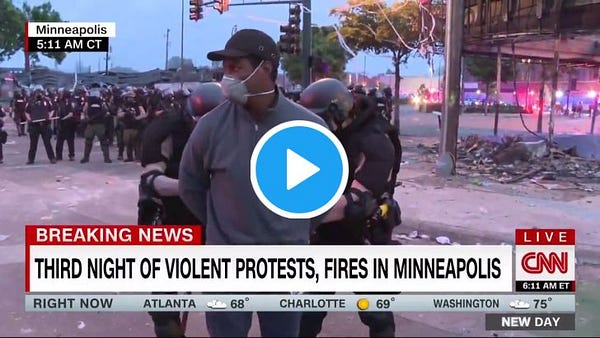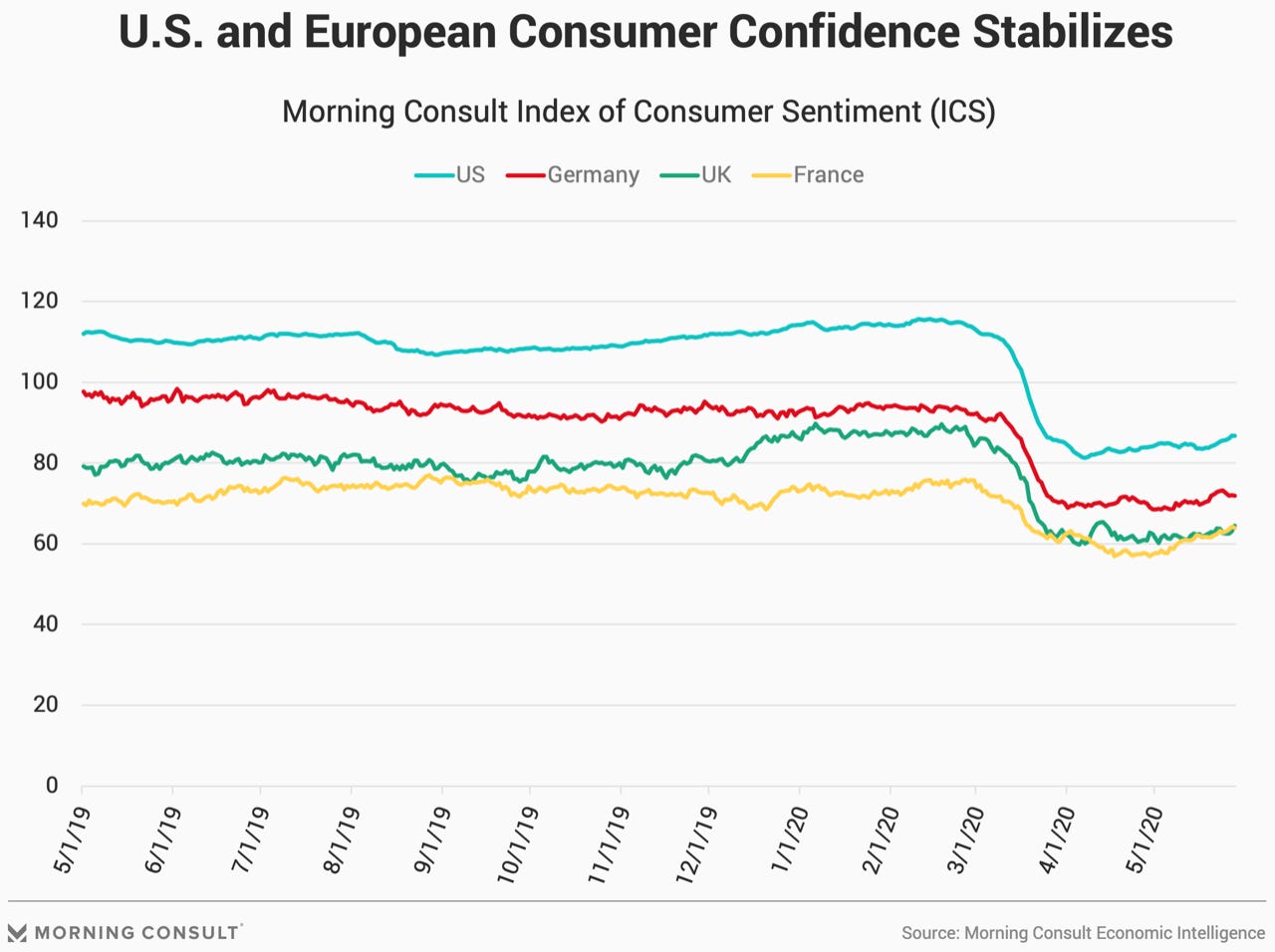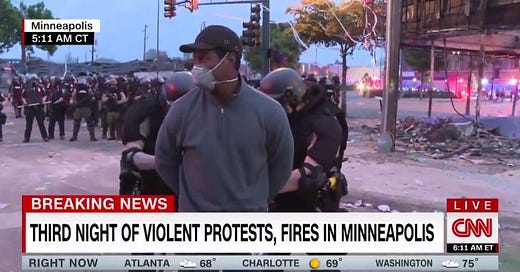Founding Member Rate: Like the newsletter? During this trial period, you 50% off the regular cost. Continued thanks to everyone who already has done so!
The World
The Twin Cities convulsed with chaos for a third straight night of violent unrest in the wake of the Memorial Day death of George Floyd as he was being restrained on the neck by a Minneapolis police officer. Rioters invaded and set fire to Minneapolis police’s Third Precinct headquarters and torched and looted many other buildings in the Lake Street corridor. Target closed its 24 Twin Cities metro stores until further notice. President Trump tweeted that he offered U.S. military support to MN Gov. Walz and that “when the looting starts, the shooting starts.” A CNN reporter Wass arrested on live TV, let go after Gov. Walz intervened. (Star Tribune)


President Trump raged against Twitter after the social media company added a warning label to a tweet he posted in the middle of the night implying that protesters in Minneapolis could be shot, escalating tensions between the president and his favorite online megaphone. (New York Times)

7 people were shot amid Louisville protests over the police shooting of an unarmed black woman, leaving a wake of destruction and anger through downtown streets. (Courier-Journal)
Hong Kong is the battleground in a US-China cold war, as theAmerican consul says U.S. actions against Hong Kong “will be as targeted as possible.” Meanwhile, European leaders are in no mood to follow the U.S. in threatening trade sanctions against China, as foreign ministers meet. Separately, a China senior general said China will attack Taiwan if there is no other way of stopping it from becoming independent, and Prime Minister Abe is urged to rethink Xi's Japan visit by own party. (Financial Times, South China Morning Post, Reuters, Nikkei Asian Review)
After precipitously falling in March and early April, consumer confidence across advanced Western economies gradually rebounded, with U.S., UK, Germany and France consumers holding moderately more optimistic views in May. (Morning Consult)

Congress and the White House are debating a “return-to-work bonus” aimed at the more than 40 million workers who filed for unemployment, as a new incentive for those who go back to work. (Washington Post)
U.S. federal and state officials have altered or hidden public health data crucial to tracking the coronavirus' spread, hindering the ability to detect a surge of infections as the nation reopens. Meanwhile in the UK, personal data about people with coronavirus, collected by the NHS as part of the test-and-trace programme, will be kept for 20 years. (Politico, The Guardian)
The CDC’s sweeping new recommendations for reopening offices would lead to a far-reaching remaking of the corporate work experience, upending years of advice on commuting by urging people to drive to work alone, instead of mass transportation or car-pooling. (New York Times)
About half of college presidents say it's "very likely" they will resume in-person classes this fall. About two-thirds with on-campus housing say they plan to set up a space to quarantine students, and more than half said they will require masks on campus. On Thursday, Purdue, Brown and Lane College presidents will give Senate testimony on “how students can safely go” to school. (EducationDive, Inside Higher Ed)
Economy
U.S. consumer spending plunged in April by the most on record. Household outlays fell 13.6% from the prior month, the sharpest drop in more than six decades of data. (Bloomberg)
U.S. savings rate hits record 33% as Americans stockpile cash, curb spending. (CNBC)
Federal Reserve Chairman Jerome Powell said the central bank’s long-awaited program to lend to small- and medium-sized businesses is “days away.” (CNBC)
The Chinese central bank moved again on Friday to support the yuan after it fell this week to its lowest level against the US dollar in eight months. (South China Morning Post)
A global glut is capping natural-gas prices, as mild May weather limited domestic demand and brimming storage facilities abroad reduced exports — all while oil well flow hasn’t declined as much as expected. (Wall Street Journal)
Technology
Uber introduced a new hourly rate for longer, multistop trips. Using the “Hourly” function, riders can set the amount of time the trip should take, thereby locking in a flat hourly rate. (The Verge)
The race to automate vehicles on China’s roads is heating up. Didi announced an outsized investment of over $500 million in its autonomous driving subsidiary, the single largest fundraising round in China’s autonomous driving sector. The round was led by existing investor Softbank, which has also backed Uber. (TechCrunch)
An analysis of 100 billion tweets that explore the use of 'stretchable' words such as 'duuuuude,' 'heyyyyy,' or 'noooooooo’ in social media provides new insights into linguistic patterns. (PLOS One)
The NSA warned that Russia’s Sandworm hackers, a Russia military arm, hijacked mail servers. (Wired)
Smart Links
What is Section 230? Understand the law that created the modern internet. (MIT Technology Review)
California listens to podcasts more than any other US state. (PodNews)
Wastewater testing gains traction as a Covid-19 early warning system. (STATNews)
Broken sense of time is bad for mental health. (Scientific American)
Astronomers find the Universe’s missing ordinary matter. (Australia ABC News)
The Louvre plans to reopen July 6. (France 24)
20 books to read this summer. (Washington Post)
Good News
Conan O’Brien addressed the Harvard College Class of ’20 and the crowd goes wild! (Not really). (Harvard Gazette)
40 years after its launch, Pac-Man was recreated by NVIDIA researchers with AI — but humans can play it. (NVIDIA)
Did you like the newsletter? Why not subscribe now?


